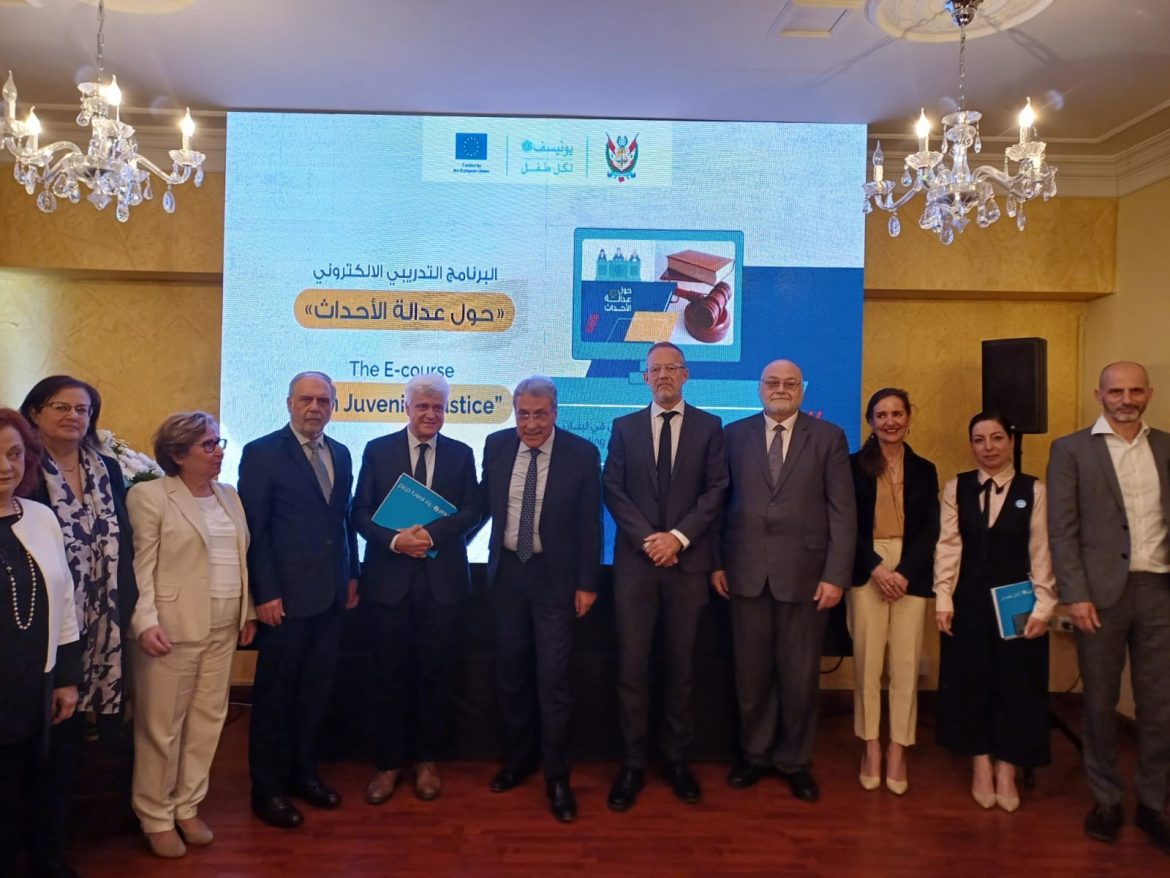The Ministry of Justice, the European Union, and UNICEF launch the first e-learning program to enhance the capacities of judges on juvenile justice.
22 April 2024 – The Ministry of Justice, in the framework of a project funded by the European Union and implemented by UNICEF, launched the “On Juvenile Justice”, a comprehensive electronic learning tool to enhance the capacities of judges on juvenile justice. The online training promotes child-friendly justice and strengthens the protection system for children and their best interests when in contact with the law.
Through this project, judges in Lebanon will have access to a specialized, standardized, and comprehensive learning resource on child justice, in Arabic. This innovative course introduces videos, interactive activities and other appealing multimedia elements The content is based on the Lebanon legal framework as well as on the international principles of child justice and addresses the Lebanese justice system.
Minister of Justice Judge Henry El-Khoury said: “The Ministry of Justice has always sought, in accordance with its roles and responsibilities, to ensure the protection for the children of Lebanon with the support of the international community and in coordination with various official bodies and civil society organizations. This is based on its belief in the concept of multidimensional humanitarian, societal, and legal protection. The importance of this program lies in its complementarity of the Lebanese judiciary’s ongoing efforts to keep pace with developments in international legal systems, especially in the era of digital transformation we are currently experiencing. It further supports the efforts of the Ministry of Justice in this framework, notably those related to implementing decree of Law 81/2018 on electronic transactions, as well as being part of the continuous training of judges on concepts of human rights in general and children’s rights in particular.”
The program consists of four modules: ‘children and the justice system’, ‘the child in danger’, ‘child victims and witnesses’, and ‘the child in conflict with the law’.
“The European Union continues to support critical efforts to reform child justice in Lebanon. We have contributed to the development of this all-important e-course, following earlier support on the establishment of child-friendly facilities inside some of the Palaces of Justice’, said Martin Skylv, Deputy Head of Delegation at the European Union Delegation to Lebanon. He added: ‘The EU remains committed to supporting the justice sector and is ready to expand its level of assistance, as long as the Lebanese authorities uphold their commitment to reform”.
The tool can be used by judges and other justice professionals at their own pace. It will also be available to future judges. At the end of the training program, part of a wider reform program, well trained and informed justice professionals will better address the issues faced by children in contact with the law.
“Children in contact with the law are among the most vulnerable children in society. And when they find themselves in that situation, it is because we, as a society, have failed them somewhere,” said Edouard Beigbeder, UNICEF Representative in Lebanon. “Since 2018, we partnered with the Ministry of Justice and the European Union to strengthen and improve the child justice system in Lebanon to address the needs of children in contact with the law and to make the justice system more child-friendly and bring it in line with international standards. While we celebrate these results, we remain committed to continuing to work towards a child justice system that is accessible, adapted to and focused on the needs and the rights of children, and that minimizes the risk of harm inflicted on them during justice proceedings”.
About UNICEF
Working in Lebanon for over 70 years, UNICEF works in some of the world’s toughest places, to reach the world’s most disadvantaged children. Across more than 190 countries and territories, we work for every child, everywhere, to build a better world for everyone.
For more information about UNICEF Lebanon and our work for children, visit www.unicef.org/lebanon/ or follow us on Twitter, Facebook, Instagram and YouTube

